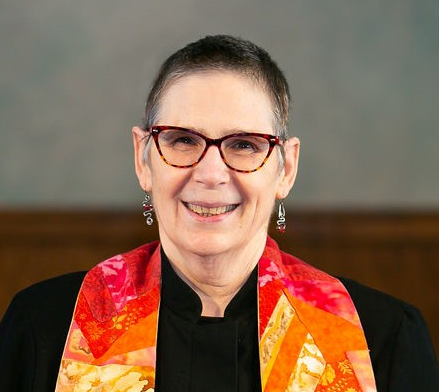Articles About Shared Governance
Our Minister and Shared Governance
(from the August 4, 2023 Weekly Update)

On August 1, Rev. Dr. Linda Hart, our Developmental Minister, begins her ministry at QUUF. She and her staff will share leadership with our Fellowship including members and lay leaders of our congregation and our Board of Trustees. Our transition to shared/policy governance began two years ago. The Governance Task Force in conjunction with the Board, continues to work on developing policies, and on clarifying roles, and communicating all this to you.
This Weekly Update article published in May of 2022 explains shared leadership. Based on her contract, our shared governance structure, and relevant QUUF polices, we summarize below clarifications of Rev. Linda’s responsibilities and her scope of authority.
The Pulpit: Our Minister is our spiritual leader. The pulpit is free. This means that the pulpit is hers to freely express personal and faith values, views and commitments that are consistent with our living tradition. She will do this both from the pulpit and in her blog, and will choose guest speakers and bloggers.
Members of the Congregation also have freedom to (responsibly) disagree – often referred to as “freedom of the pew” – but not a right (unless invited) to do so from the pulpit. This policy describes our QUUF practice and balance of free and responsible expression.
Worship services: As our spiritual leader, our Minister is accountable for services, and has decision-making authority; services must be preapproved by her. She will work closely with others, including the Sunday Services Team.
Programs: Our Minister has oversight over and ultimate responsibility for QUUF’s programs. She serves as a non-voting, ex-officio member on councils and teams, and as a voting member of the Ministry Advisory Team (currently on hiatus), and the Program Council, which provides an organizational structure for five ministry councils and their related teams. She appoints the Program Council Chair.
She has authority to start new programs and classes, or to change how a program is organized or facilitated and, as detailed in her contract, will prioritize programming for spiritual growth and for education about Unitarian Universalism, and will determine goals, policies and practices for Adult Learning Programs. She will do this in coordination with others. If there are disagreements, she is the final decision maker on ministry activities in collaboration and consultation with QUUF leadership and/or the Healthy Community Team, as deemed appropriate and as detailed in the Alignment Policy. https://www.quuf.org/pdfs/Governance/Policy-Alignment–2303.pdf
Communications: Our Minister has oversight responsibility for QUUF congregational and public communications, except those from the Board.
Staff: Our Minister supervises the staff team and works with the Personnel Committee to hire staff, consistent with Board policies.
Budget: Our Minister works with the Finance Committee to submit the annual budget.
Board of Trustees: Our Minister is a non-voting, ex-officio member of, answers to, and provides information for, the Board of Trustees. She has the responsibility and authority to achieve the goals set by the Board. She serves on the Executive Team.
Congregation: The Board is of course elected by, and is answerable to, the Congregation.
This in a nutshell is shared governance – a balance of responsibility, and decision making authority.
Let’s welcome Rev. Linda with open arms, open hearts, open minds, and with willingness to work together to re-imagine a future for, and to build bridges within, our community. Understanding and respecting our Minister’s role is key to a future thriving Fellowship.
Who, Exactly, is Sharing QUUF’s Governance?
(from the May 5, 2022 Weekly Update)
This is an informational article about our shared governance model.
A Message from your Governance Task Force (Karl Bach, Cynthia Becker, Julia Cochrane, John Collins, Patrick Johnson, Frances Loubere, Betty O’Bryan, Anne Weaver and Bruce Zalneraitis)
It’s the beginning of May, and the Fellowship year will soon come to a close. Shared Governance, a model that was presented at the 2021 Annual meeting, and is designed to keep pace with the new demands that come with growth (our congregation has more than doubled in membership and physical space over the past 12 or so years), has begun taking shape and is becoming a reality. You may be wondering why it’s taking so long. Well, implementation of any new governance model is a 3-to-5-year process. That means change takes place gradually and time is taken to make course corrections along the way.
The design of QUUF’s shared governance structure is based on strong partnership. As is true of any partnership, all three of our partners fulfill integral roles within our Fellowship and it’s critical that they work together.
Who are the partners within our shared governance?
Members of QUUF who make up our board committees, teams, and task forces, who make up our congregational committees, and who make up our ministry councils and teams. Whether it’s Governance, Nominating, Endowments, Newcomer Outreach, the Pledge Campaign, Green Sanctuary and Environmental Action, AHA, or Sunday Services, our many committees, councils, taskforces, and teams have been meeting, planning activities, advocating and striving to embody the mission of QUUF throughout this year.
Ministers, Lay Leaders and Staff plan and support effective programs. These lay leaders include the Program Council chair and leads of the five councils that make up the Program Council. Basically, that’s you and me. Ministers have the ultimate responsibility for the success of QUUF’s programs and answer to the Board of Trustees. QUUF staff provides support to every single team within QUUF and they are CRITICAL to the success of our programs.
Our Board of Trustees articulates mission, vision, values and strategic goals, and works with our ministers to ensure these are embodied within the programs of the Fellowship.
Unfortunately, the life of our Congregation didn’t stop and wait for our new governance structure to be fully implemented, and when issues have arisen during this year it has been incumbent upon our Board of Trustees to handle them.
As we move forward into years two, three, and beyond of our governance transition, and specific policies are developed to help us function within our shared structure, issues that arise will generally be managed by lay leaders in our councils in consultation with our ministers, and with our new congregational Healthy Community Team as a resource. Our Board of Trustees will have the time to focus on vision, mission and goals.
What is the Program Council and What are Ministry Teams?
(from the March 11, 2022 Weekly Update)
The Program Council is part of the new governance model and is comprised of the leaders of five councils and a chair. The purpose of the Program Council is to provide a forum for communication, to share ideas, and to support the work of the ministry teams including the recruitment and training of volunteers and planning events. Heretofore, the thirty plus ministry teams have variously been called action groups, committees, and task forces.
The five councils consist of representatives of the several ministry teams that make up each of the councils and are grouped according to the general focus of their work. For example, the Newcomer Outreach and Pastoral Care Teams are part of the Community Council. ALPs and the Religious Education Team are part of the Growth and Learning Council. The Safety and Risk Management and Facilities Teams are part of the Operations Council. The Denominational Affairs and the Pet Keepers Teams are part of the Social Justice and Environmental Action Council. The Music Program and Sunday Services Teams are part of the Spirit Council. The council leaders are chosen by representatives of the ministry teams that make up the council .
The five councils and the council leads are:
- Community Council – Betty Oppenheimer, Lead
- Growth and Learning Council – Dan Brooks, Lead
- Operations Council – Kate Madson, Lead
- Spirit Council – Mary Tucker, Lead
- Social and Environmental Justice Council – Kathy Stevenson, Lead
The council chair is chosen by the senior minister. Patrick Johnson is the current Program Council Chair.
What’s Up With Governance
(from the January 21, 22 Weekly Update)
Keeping up with everything that’s happening at QUUF is difficult under the best of circumstances, during the pandemic, when communication is virtual and we’re not standing in the Fellowship Hall chatting after a service, it’s even harder to know what’s going on. So you may be surprised to learn the transition to the shared governance structure that was introduced at our 2021 Annual Meeting is moving forward and gaining momentum.
Our Ministry Teams (formerly called Committees) have continued to create, plan and coordinate the programmatic work that is at the heart of QUUF. Ministry Team Chairs are starting to connect with, and support each other, through their Councils. Social and Environmental Justice is an impressive, long-standing Council with Kathy Stevenson at the helm. They’ve established new programs, such as Safe Park, during the pandemic. The Community Council has had several enthusiastic, positive meetings. They’ve created their Charter; which clarifies their role within the Fellowship, their working practices and how they can best serve all members. Betty Oppenheimer is leading this dynamic team. Growth & Learning Council has had their initial meeting and Dan Brooks offered to lead this Council. Spirit and Operations Council have had their initial meetings and discussions regarding who will lead these Councils are currently in process.
The Program Council, which will be made up of the 5 Council Leads and the Program Council Chair, is planning to have their first meeting in the first part of February. These meetings will provide a forum for high level communication, support, connection and collaboration for programs at QUUF.
In an area that is less visible, but vital to our Fellowship, the Board has asked the Governance Task Force to review the By-Laws and the Operations Manual with the objective of suggesting revisions and policies that ensure continuity with our governance structure. After completion these documents will be shared with the Board, and ultimately with the entire congregation. Stay tuned for more information!
This page last updated August 19, 2022
